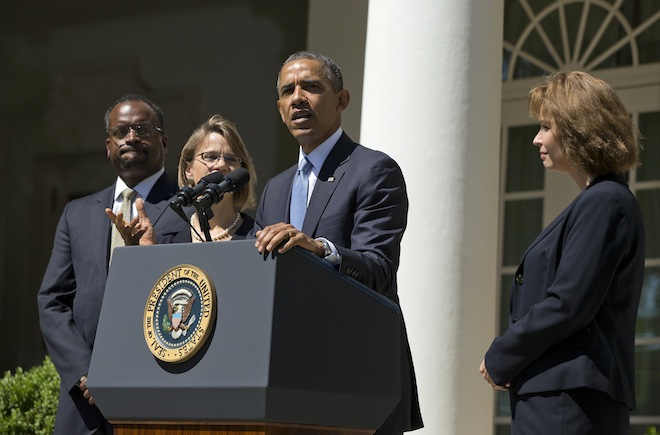Senate Republicans on Monday sustained a filibuster of a third consecutive nominee to the second most powerful federal court, putting Democrats in a bind between surrendering on a high priority and threatening to reform the filibuster with the “nuclear option.”
A procedural vote to advance the nomination of Robert Wilkins to the D.C. Circuit Court of Appeals received 53 votes (short of the 60 needed) and 38 votes against. It was the GOP’s third filibuster in three weeks — they also blocked Patricia Millett and Nina Pillard to the same court, without taking issue with any of their qualifications.
Senate Majority Leader Harry Reid (D-NV) saw the filibuster coming and attacked the Republican premise as “absurd on its face,” noting that “my Republican colleagues were happy to confirm four [George W.] Bush nominees to this court” last decade. But, notably, he said nothing about a possible rules change, signaling he either doesn’t have the votes or isn’t ready to go there. Numerous Democrats are clamoring for filibuster reform, but Reid needs 50 votes (his caucus has 55 members) to modify the rules. He’s expected to take the temperature for prospective filibuster reform on Tuesday at Democrats’ weekly lunch meeting.
“We need to call out these filibusters for what they are: naked attempts to nullify the results of the last Presidential election — to force us to govern as though President Obama hadn’t won the 2012 election,” Sen. Elizabeth Warren (D-MA) said in a floor speech last week. “If Republicans continue to filibuster these highly qualified nominees for no reason other than to nullify the President’s Constitutional authority, then senators not only have a right to change the filibuster rules — senators have a duty to change the filibuster rules. We cannot turn our backs on the Constitution. We cannot abdicate our oath of office.”
Republicans haven’t flinched, daring Democrats to go nuclear and dismissing their threats as empty rhetoric. Their mass filibuster is supported by House Republicans, GOP attorneys general and conservative groups focused on having a conservative judiciary.
“All I can say is this — be careful what you wish for,” Senate Judiciary Ranking Member Chuck Grassley (R-IA) said last week, before the second of three D.C. Circuit filibusters. “If the Democrats are bent on changing the rules, then I say go ahead. There are a lot more [Antonin] Scalias and [Clarence] Thomases that we’d love to put on the bench.”
As a result of the filibusters, three seats remain vacant on the D.C. Circuit court, which looms large in President Barack Obama’s second term as it tends to have the final say on matters of executive authority. Republicans say none of the seats need be filled due to the court’s relatively low caseload, which Democrats decry as a hypocritical argument that obscures to GOP’s real motivation to maintain the court’s strongly conservative lean. Four of its eight active judges are Democratic-appointed, but five of its six senior judges — who routinely rule on cases — are Republican-appointed.
“Almost all the cases on the D.C. Circuit that are decided now include a senior judge, so the court tilts very conservative,” said Norm Ornstein, a congressional scholar at American Enterprise Institute, a conservative think tank.
Ornstein recently told TPM that the GOP’s repeated filibusters of D.C. Circuit nominees was “absolutely ridiculous” and reflected an abuse of the advise-and-consent power. He said he’d “hate to see” a rules change but “if [Republicans are] not going to yield, if we don’t get an agreement to let these nominees through, then I don’t see much other choice.”
“If [Senate Minority Leader] Mitch McConnell had the opportunity — if you had a conservative Republican president and they had the Senate — we know for sure they’d be filling these seats,” he said. If Democrats refused to let any nominees through, he said, “Mitch McConnell would change the rules in a nanosecond. He wouldn’t hesitate. … They’d even be packing these courts — if they had the House too, they’d be adding judges.”
Before the Wilkins vote, McConnell accused Reid of seeking to “concoct a crisis on the D.C. Circuit so it can distract Americans from the failings of Obamacare.”
TPM asked Reid about filibuster reform last Wednesday and he said it’s “something that they should be concerned about” but didn’t go further. “[There is] as Senator [Dick] Durbin said yesterday, a tipping point,” he said. “I’m not sure we’re there.”






